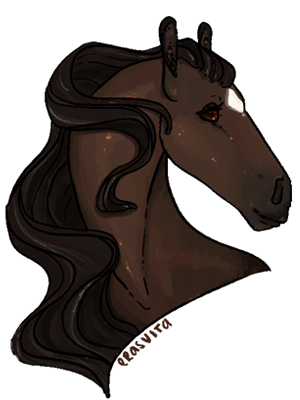
A S T E R I O N
in sunshine and in shadow*
When she whispers to the air between them (colored with stained glass as it is, evening caught fast in the castle, dusk on each flagstone and dusk on their skin) he wants to deny her words. But Asterion cannot, not when they each know better, not when it would be a lie.
“I can’t pretend I didn’t know what I was accepting,” he answers her, and his eyes are dark and soft and knowing. They speak of burdens unfairly shouldered, and gods who turned their faces away, and cruel kings of neighboring kingdoms, and trials and troubles and regret. It would be worth it (if any lives lost could be worth it, any storms weathered) he thinks, to see Florentine before him again, healed and whole. To see the Dusk Court rise, unbroken, unafraid.
For that hope he would shoulder anything. For that he will be brave.
Asterion is startled when she continues, when her sorrow turns to birds-wings, when she studies him like he is something that might someday be gone. He shifts beneath the weight of her gaze, flushing warm with her words. It is only her laughter, clear as a bell, that draws his gaze back. In the spilling golden light she stands, looking terribly young and terribly grown, a queen from a distant kingdom and a girl who shared his father. When she tells him she loves him, he only bows his head.
“Once or twice,” he allows with a smile, “but never while looking so serious.” Never with tears in your eyes, he means, but he will not mention them if she won’t, not when he can feel them stinging at his own, unbidden.
Oh, but they build silver behind the nebulae-dark of his own gaze, because Asterion’s head is realizing what his heart already knows. The only thing that surprises him is that he does not feel broken, does not even feel grief. Of course there is sorrow, a slumbering sea, a wave that has always carried him - but looking at his sister there is fierce joy, too, and a fiercer love, a love like a lion, a love like the sun.
He wants to look away from her gaze, which pierces him the same way her dagger could; he wants to meet it forever. Instead he reaches for her the way he has a hundred times, tucking his forehead against the slender column of her throat. Embracing her is like standing in sunlight, the warm scent of her flowers like welcoming spring.
For a long time he does not step away, and when he does it is with a shuddering, steadying breath. Asterion smiles at his golden sibling, and pays no heed to the tears that track dark down his cheeks. “Well, my time-traveling sister,” he says, “where are you going, then?”
What he does not add, what he cannot (for he already knows the answer, no matter what she might say) is can I come with you, too?
@
